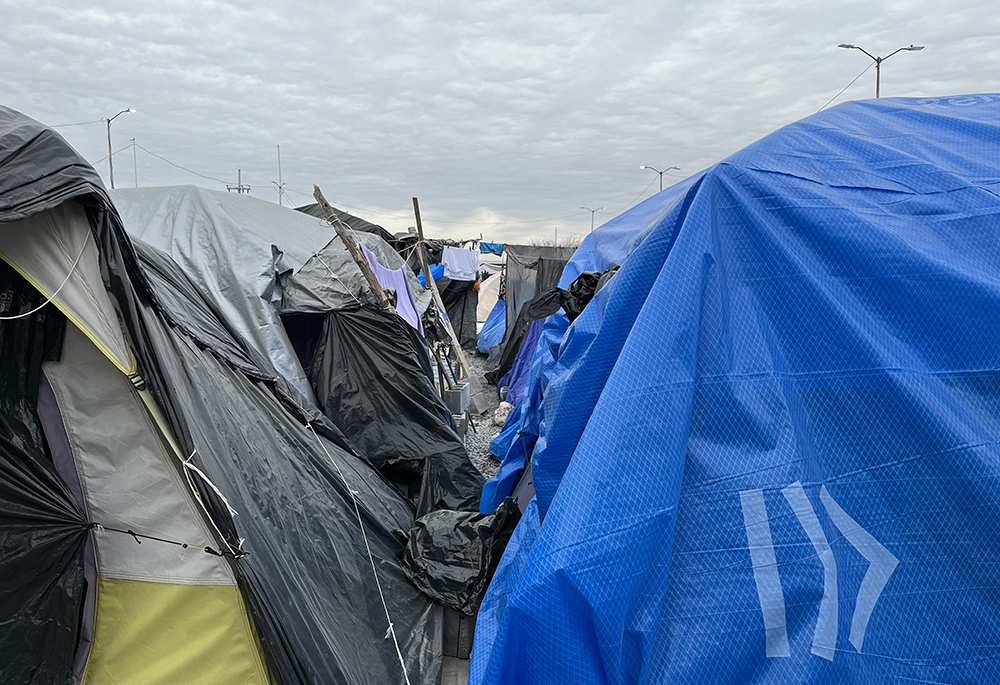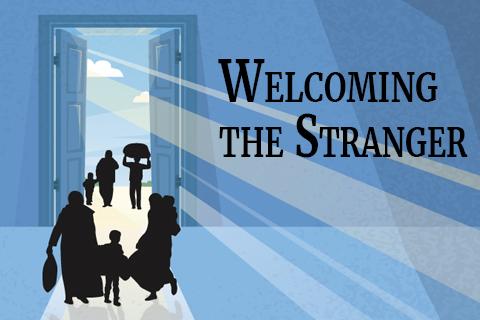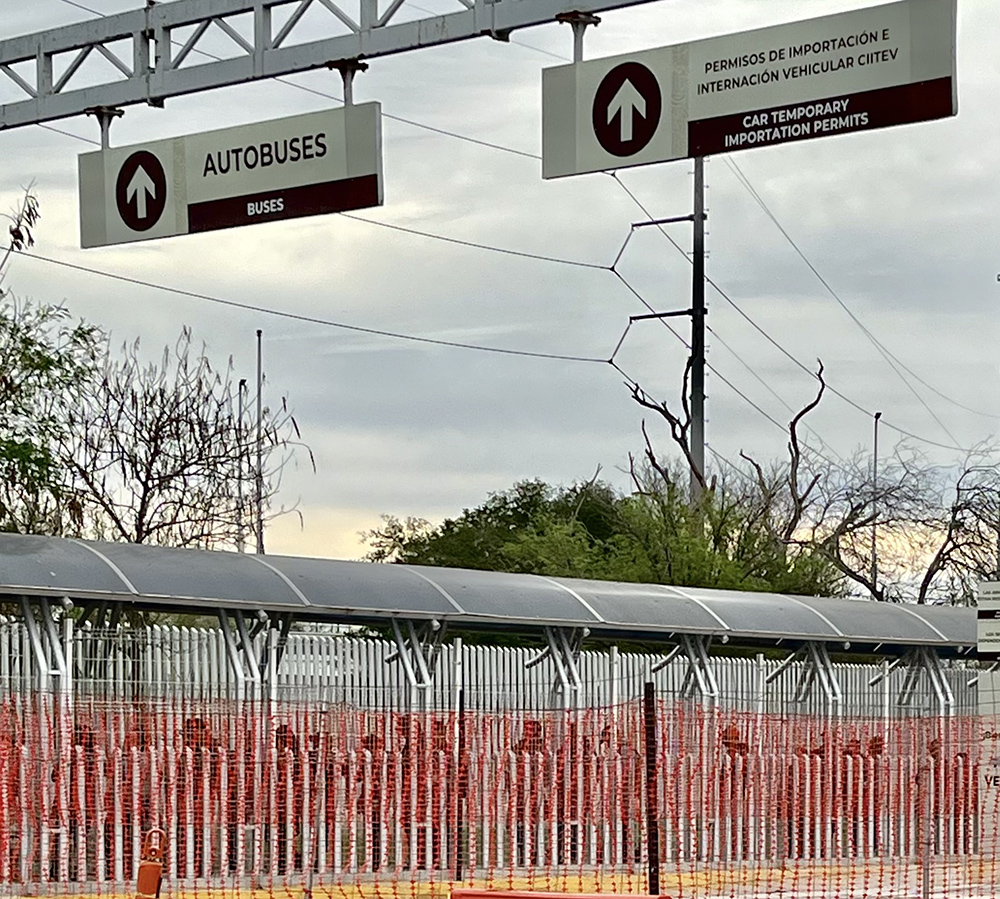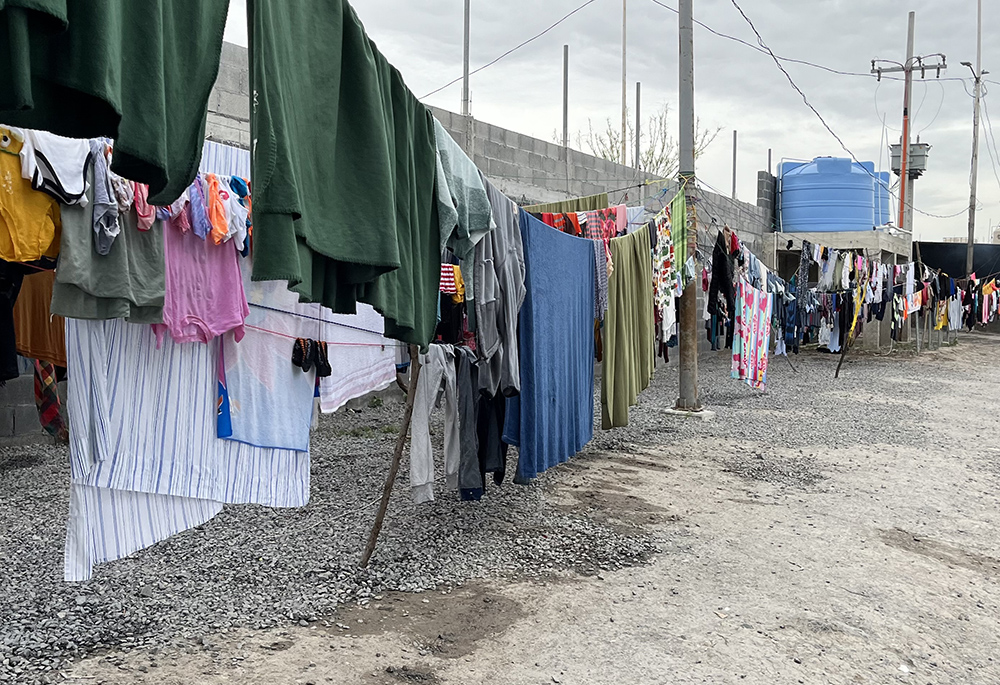
Makeshift tents are pictured at the migrant camp Senda de Vida 2 in Reynosa, Mexico, where hundreds of migrants stay, waiting to get their appointments to be interviewed at the border crossing, which can take up to six months. (Nancy Sylvester)
Editor's note: Global Sisters Report's new series, "Welcoming the Stranger," takes a closer look at women religious working with immigrants and migrants. While we cover this topic often, this series will feature sisters and organizations networking to better serve those crossing borders, global migration trends and the topic of immigration in the upcoming U.S. presidential election.
In the beginning of Lent, the Scripture tells of Jesus' time in the desert. He withdrew from his normal routine to be alone in prayer with his Abba God. During that time, we are told of how Jesus wrestled with the devil and resisted his promises of riches, glory and power. After 40 days, he returned transformed, ready to begin his public ministry — preaching, teaching and healing in ways unfamiliar to both the Jewish leaders and the Roman officials of his time.

Today we might say it was his dark night of the soul. He awakened to who he was and his new way of seeing the people around him and the time he was living in. I believe Lent invites us to take the time needed to become more aware of who we are and how to see others in a new way so as to respond out of love.
I was privileged to begin this Lent with this sort of time. For two weeks I volunteered with the sisters from the three Immaculate Heart of Mary congregations — IHMs of Monroe, Michigan, of Scranton, Pennsylvania, and of Philadelphia, Pennsylvania. The IHM congregations, together with the Oblate Sisters of Providence from Baltimore, Maryland, have formed an OSP-IHM house on the border in McAllen, Texas, adjacent to Reynosa, Mexico. Although the immigration issue is not new to me, my experience of "time" here opened me to another way of seeing it more deeply.

The border crossing between Reynosa, Mexico, and McAllen, Texas (Nancy Sylvester)
I immersed myself in the work of these sisters at both the respite center in McAllen, where the people, mainly families, stay as they wait to go to their final destination in the States, and two of the holding areas in Reynosa — Casa del Migrante and Senda de Vida 2. The latter is where hundreds of migrants stay 2-6 months waiting to get their appointment to be interviewed at the border. I came wanting to be present to the people and the work.
The rhythm was so different from what I am used to. Although activities might be planned, they are always second to what is needed at the time. The real work is being present to the people in whatever way you can, even if it is only with a smile and a hug. There is a lot of standing around and waiting.
Advertisement
It was this time of waiting that created the space within me to awaken to a new way of seeing.
Waiting to walk across the border. Waiting every day for weeks to see when your name appears on the official app, signaling that you have an interview at the border. Waiting for food. Waiting for a time to wash your clothes. Waiting for a tent or a place in the camp to claim as yours. Waiting for clothes to travel to your new home. Waiting for your sponsor to contact you and to provide your ticket to get to your new home in the United States.

The migrant camp Senda de Vida 2 in Reynosa, Mexico (Nancy Sylvester)
As I waited and was present to these people waiting, I felt a space opening within me. I wondered, could I do it? Could I be patient and compliant, waiting with hundreds of others in cramped quarters with my family for days on end? Could I sleep in either dormitory-type areas or in tents sandwiched in night after night? Could I handle the extremes of Texas/Mexico weather with the few clothes I would have carried? Could I keep my children happy and hopeful as they spend each day playing in a cramped space with limited access to toys and activities? Could I handle the memories of what I left behind — a job, a house, relatives, friends? Could I trust again after being betrayed by coyotes or others who took the little I had left to start a new life?
If I'm honest with myself, I don't think I would do very well.
Waiting and seeing the migrants from the spaciousness of my heart rendered judgment impossible and generating solutions inadequate. They do not deserve to be branded with vile rhetoric or become a casualty of a political stalemate. The immigration issue is certainly a complicated public policy issue but the people are not. They are our brothers and sisters. They are the ones with whom we will share our future living together in the same country. They hold the hope of so many who have come to the United States. It is the hope of freedom from want, from tyranny, from persecution and violence. It is the hope for decent living conditions, for new opportunities, for a better life for oneself and one's children.
Contemplation invites us to empty ourselves and create a spaciousness within, where we can encounter Divine Love. In that spaciousness we can awaken to see the people in our lives, in our world, in new ways and respond accordingly.
Jesus took time and waited for 40 days. That waiting created a spaciousness within him to see the people of his day in new ways. He had encountered Divine Love, and it changed him, alluring him into his public ministry which would lead to his crucifixion.
It seems that we, as Christians and as citizens, are in need of a similar conversion or transformation. It seems we, too, need to be allured into a public ministry that has us teach and preach a message in new ways disconcerting to many who are in power.
Contemplation invites us to empty ourselves and create a spaciousness within, where we can encounter Divine Love. In that spaciousness we can awaken to see the people in our lives, in our world, in new ways and respond accordingly.
We may not have 40 days or two weeks this Lent, but we can seize the moments we have and create the time to enter into the contemplative space of our heart and wait there long enough to take a long loving look at the real and then go out and preach the good news.
P.S. Perhaps today is the day to take time as this is Feb. 29 — a day which we only have once every four years. A unique moment in time. Use it well.







